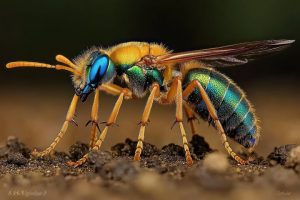Researchers have discovered that larvae of jewel wasps that undergo a “developmental pause” live longer and age almost 30% slower at the molecular level. This slowdown is linked to conserved biological processes, suggesting potential applications for the human aging process. A study of jewel wasps, known for their distinctive metallic colors, has shown that as larvae, they can take a kind of natural “time out” before entering adulthood with this surprising advantage. The groundbreaking study by scientists at the University of Leicester was published in the journal PNAS. It shows that this developmental pause in wasps dramatically extends their lifespan and slows down the so-called “epigenetic clock” that indicates molecular aging.
Longer Lifespan for Wasp Offspring
Aging is not just a matter of the number of birthdays, but also a biological process that leaves molecular fingerprints in our DNA. One of the most accurate markers of this process is the epigenetic clock, which tracks chemical changes in DNA called methylation that accumulate with age. But what happens when we alter the course of development itself? To find out, a team from the University of Leicester, including lead author Erin Foley, Dr. Christian Thomas, Professor Charalambos Kyriacou, and Professor Eamonn Mallon from the Department of Genetics, Genomics, and Cancer Sciences, turned to Nasonia vitripennis, also known as the jewel wasp.
This tiny insect is becoming a powerful model for aging research because, unlike many other invertebrates, it has a functioning DNA methylation system, just like humans, and a short lifespan that makes it ideal for studies. The researchers exposed jewel wasp mothers to cold and darkness, triggering a winter-like state in their babies called diapause. This natural “pause button” extended the lifespan of the offspring by more than a third. Even more remarkable is that the wasps that underwent diapause aged 29% slower at the molecular level than their counterparts. Their epigenetic clocks ticked slower, providing the first direct evidence that the pace of biological aging in invertebrates can be controlled by developmental factors. “It’s as if the wasps that took time out early in life came back with extra time on the bench,” said Eamonn Mallon, professor of evolutionary biology and lead author of the study. “This shows that aging is not set in stone, but can be slowed down by the environment even before adulthood begins.”
The Wasp Could Provide Important Answers to How we Humans can Slow Down the Aging Process
While some animals can slow down the aging process by entering a state of dormancy, this study is the first to show that the benefits persist even after development resumes. Furthermore, the molecular slowdown was not a random effect, but was associated with changes in important biological signaling pathways that are conserved across species, including those involved in insulin and nutrient sensing. The same signaling pathways are also the target of anti-aging measures in humans. What makes this study so novel and surprising is that it demonstrates a long-lasting, environmentally induced slowing of the aging process in a system that is both simple and relevant to human biology.
It provides compelling evidence that events in early life can have a lasting impact not only on health but also on the pace of biological aging itself. This study opens up new avenues of research, not only into the biology of wasps, but also into the broader question of whether we can one day develop measures to slow down aging at its molecular roots. In short, this wasp could provide important answers to how we can halt the aging process.






